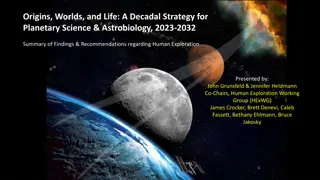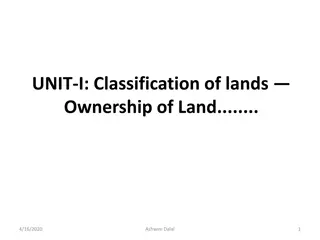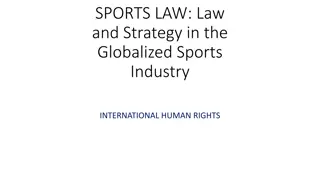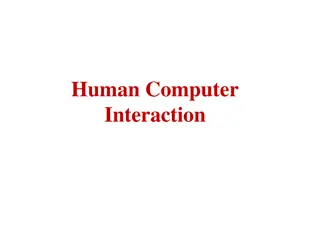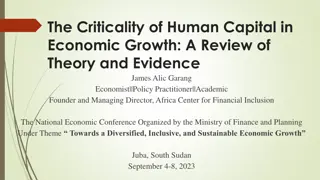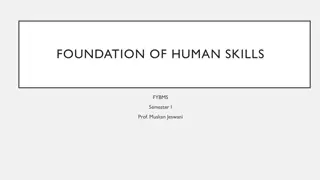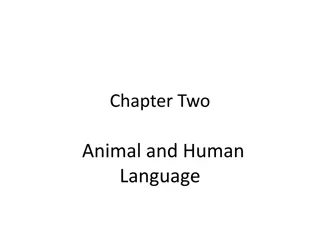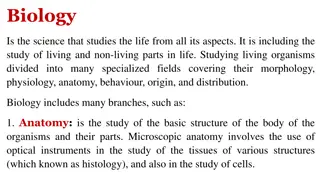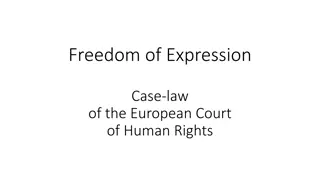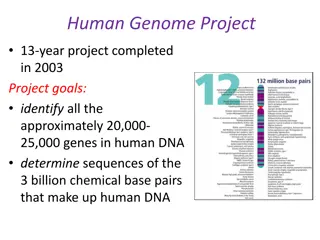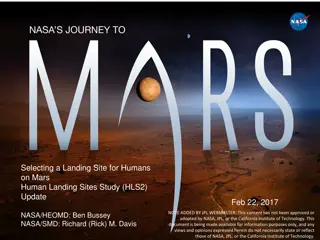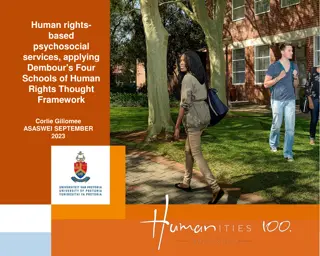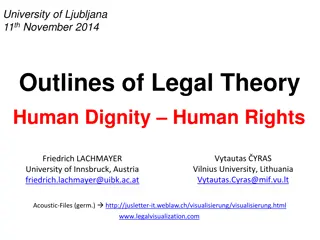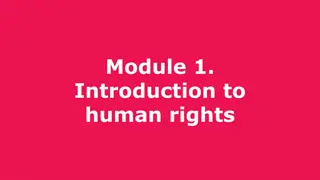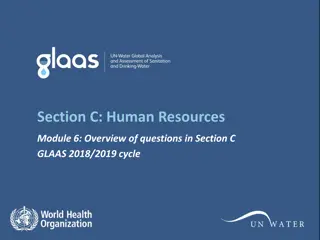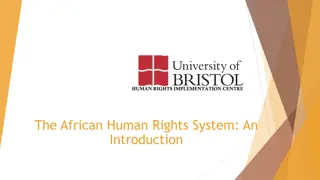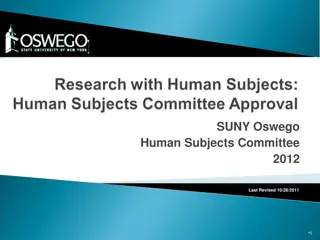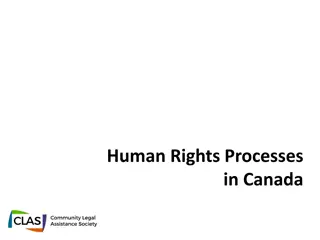Human Systems Integration in Technology Development
Human Systems Integration (HSI) is a crucial interdisciplinary process in systems engineering that integrates human factors to enhance system design, reduce costs, and optimize performance. This presentation by NASA experts delves into the benefits of HSI, the human readiness level metrics, and its
2 views • 23 slides
Approaches to the study of Human Rights
The Marxist perspective on human rights emphasizes social rights over individual rights, viewing the full realization of self within society. Marx connects bourgeois society with human rights, highlighting how exploitation under capitalism alienates individuals. In contrast, the Third World perspect
5 views • 19 slides
Overview of Human Factors and Automotive Standards YouTube Series
This YouTube series, led by Paul Green from the University of Michigan, covers human factors and automotive standards. It includes topics like introduction to standards, core human factors standards, automotive human factors standards, human-computer interaction standards, and SAE vehicle standards.
7 views • 9 slides
Evolution of Human-Environment Relationship Through History
The evolution of human-environment relationships can be traced through four key stages - from hunting and food gathering in early human history to the modern era of science, technology, and industrialization. Each phase reflects changing attitudes towards nature and resource utilization, highlightin
0 views • 10 slides
Understanding Human Rights: Overview and Evolution
Human rights encompass various aspects such as human needs, generations of rights, individual status, and the indivisibility of rights. Dr. Anna Ledzi ska-Simon discusses the translation of human needs into rights, the historical evolution of rights across generations, individual rights according to
3 views • 17 slides
Understanding Human Rights in Queensland Government Work
The Human Rights Act of 2019 in Queensland outlines protected rights such as equality, freedom of expression, and fair trial. All public service employees must adhere to these rights, ensuring decisions and actions respect human rights. This act applies to everyone in the Queensland Government, with
2 views • 13 slides
Impact of Human Population Growth on Environment and Welfare
The rapid growth of the human population is placing immense pressure on the environment, leading to increased demand for resources like food, water, and shelter. The effects of human activity on the environment have escalated significantly over the years due to population expansion. High birth rates
0 views • 8 slides
Understanding the Basic Concept of Human Rights in Modern Jurisprudence
Human rights are natural and inalienable, essential for human life, based on universal principles. The concept of human rights is both simple and complex, requiring societal development and political will for implementation. Rooted in natural law theory, human rights have evolved from natural law to
1 views • 24 slides
Overview of Saddleback College Human Services Program 2023
Providing insight into the 12th Annual Human Services Information Session, the program overview, academic counseling, pursuit of higher education, certification processes, and the dedicated Human Services Team at Saddleback College. The session explores the significance of social and human service w
2 views • 31 slides
Understanding the UK Human Rights Act: History, Impact, and Future Changes
Explore the UK Human Rights Act, including its historical background, impact on cases, the image problem it faces, and potential future changes. Learn about the Universal Declaration of Human Rights, the European Convention of Human Rights, the Council of Europe, and how the Human Rights Act applies
1 views • 24 slides
Exploration Strategy for Planetary Science & Astrobiology 2023-2032
The decadal strategy outlines a comprehensive plan for planetary science and astrobiology, emphasizing the integration of human exploration activities with scientific objectives. Key elements include leveraging planned human space missions for new scientific opportunities and identifying areas of pl
9 views • 10 slides
Understanding Land Classification and Ownership
Land plays a crucial role in human society, serving as a resource base and a place for human activities. This resource is utilized for various purposes, and its management is vital for meeting human needs. The classification of land into biological, economic, physical, and spatial entities influence
2 views • 58 slides
Law, Strategy, and Human Rights in Global Sports Industry
The content delves into the legal aspects and strategic considerations within the globalized sports industry with a focus on monopolization, abuse of dominant position, and human rights constraints on sporting entities. It discusses the implications of attaining monopoly power, abuse by National Gov
0 views • 15 slides
Understanding Human Perception and Interaction in HCI
Human-Computer Interaction (HCI) involves the study of how humans interact with computers using various input and output channels such as vision, hearing, touch, and memory. Vision is crucial as it is the primary source of information, while hearing and touch play significant roles in conveying info
1 views • 12 slides
Understanding Media Ecology: Impact of Communication Technology
Media ecology is a theoretical concept analyzing the influence of media and communication technology on human culture. Neil Postman, a prominent figure in the field, delves into how communication media affect human perception, understanding, and values. This study views media as environments shaping
5 views • 23 slides
The Critical Role of Human Capital in Economic Growth: A Review
Literature highlights the significance of human capital formation in driving economic growth and achieving macroeconomic objectives. Human capital accumulation enhances productivity, reduces unemployment, poverty, and inequality, underscoring the need for investments in education, health, and job tr
0 views • 25 slides
Understanding Human Nature and Individual Differences in Foundation of Human Skills
Explore the foundational concepts of human behavior, individual differences, and organizational culture in the study of human skills. Delve into topics such as human nature, personality, attitudes, intelligence, and learning in Prof. Muskan Jeswani's course. Understand the significance of inter- and
0 views • 11 slides
Uniqueness of Human Language and Communication Contrasted with Animal Communication
Human language possesses unique properties such as reflexivity, displacement, and arbitrariness, setting it apart from animal communication. These distinctions enable humans to communicate abstract concepts, discuss past and future events, and use arbitrary linguistic forms. The contrast between hum
1 views • 17 slides
Understanding Human Behavior: Insights for Social Workers
This material delves into the intricacies of human behavior, exploring factors influencing behavior such as heredity, environment, intelligence, needs, and motives. It covers the concept of human behavior, stages in life from conception to old age, and theories of human development by eminent psycho
2 views • 71 slides
Evolution of Human Rights: From Ancient Times to Modern Era
Throughout history, ideas of rights and liberty have evolved, leading to the recognition of universal human rights in the modern sense. The concept of human rights can be traced back to significant historical events such as the English Bill of Rights, the Virginia Declaration of 1776, and the French
0 views • 7 slides
Impact of Correlation on Human Reliability Analysis
Understanding the impact of correlation between Performance Shaping Factors (PSFs) on their multipliers in the context of Human Reliability Analysis (HRA), particularly focusing on the SPAR-H method. The correlation among PSFs, such as stress, complexity, and training, is evaluated to determine how
1 views • 25 slides
Exploring the Fascinating World of Biology and Human Biology
Biology is a broad scientific field encompassing the study of living organisms and their various aspects, from anatomy and physiology to genetics and evolution. Branches of biology include anatomy, histology, cytology, physiology, embryology, genetics, molecular biology, biochemistry, zoology, botan
0 views • 21 slides
Understanding Freedom of Expression: European Court of Human Rights Case Law
The European Court of Human Rights upholds human rights and democracy through its case law on freedom of expression. The Council of Europe, with 47 member states, established the Convention for the Protection of Human Rights and Fundamental Freedoms as the European standard for human rights protecti
0 views • 29 slides
Evolving Human Societies: From Parasitism to Mutualism with Earth
Human societies can transition from parasitic relationships with the Earth to mutualistic ones, mirroring examples from nature. Explore the concepts of parasites and mutualists in both ecological and human contexts, and consider Earth as a host and organism interconnected in delicate balance. Reflec
0 views • 7 slides
The Link Between Democracy and Human Rights
The core of democracy lies in promoting equal human worth and self-determination. There is a strong connection between human rights, democracy, good governance, and development. Democracy allows people to participate in decision-making, ensuring their views are heard. It upholds freedom, equality, f
0 views • 15 slides
Understanding Genetic Disorders and the Human Genome Project
The Human Genome Project, completed in 2003, aimed to identify all human genes and DNA sequences. Genetic disorders, like autosomal disorders and Huntington's disease, can result from mutations at different levels, affecting single genes, chromosomes, or multiple genes. Albinism and cystic fibrosis
0 views • 37 slides
Selecting Landing Sites for Humans on Mars: HLS2 Study Update
The Human Landing Sites Study (HLS2) aims to identify suitable landing sites for human exploration on Mars, focusing on Exploration Zones (EZs) that meet scientific, engineering, and human criteria. Leveraging data from the Mars Reconnaissance Orbiter (MRO), the study establishes a database of high-
0 views • 15 slides
The Significance of Human Rights in the Modern World
Human rights are fundamental rights that belong to all individuals, are inalienable, indivisible, interconnected, and should be respected without prejudice. The Universal Declaration of Human Rights, adopted in 1948 after WWII by the United Nations, is a crucial milestone document emphasizing human
0 views • 5 slides
Overview of Human Resource Management in Organisations
Human Resource Management (HRM) is crucial for the success of organizations as it involves managing human resources effectively. This includes understanding the unique attributes of human beings, optimizing limited resources, and achieving organizational, individual, and social objectives efficientl
0 views • 32 slides
Evolution of Ethics in Human Subjects Research
Human Subjects Research (HSR) or Human Subjects Use (HSU) plays a vital role in medical research, with a historical background and strict ethical guidelines in place. From past atrocities to contemporary practices, the use of human subjects has evolved, emphasizing the importance of informed consent
0 views • 26 slides
Enhancing Transparency in Human Rights Performance Measurement
This information focuses on initiatives like the Human Rights Measurement Initiative (HRMI) that aim to provide new data for researching and advocating human rights issues globally. The HRMI project, founded in 2015, collaborates with various stakeholders and is funded by philanthropic grants. It em
0 views • 19 slides
Human Rights-Based Psychosocial Services and Dembour's Framework
Human rights-based social work practice involves upholding principles such as human dignity, nondiscrimination, participation, transparency, and accountability. It is rooted in advocacy, activism, and the application of Dembour's Four Schools of Human Rights Thought to offer psychosocial support aft
0 views • 21 slides
Outlines of Legal Theory Human Dignity – Human Rights
Explore the significance of human dignity and human rights within legal theory, reflecting on their cultural, moral, and legal implications. Delve into the essence of human rights as an essential cultural achievement, contrasting the protection and denial of human images within different legal conte
0 views • 10 slides
Understanding Human Activity from GPS Tracks
Utilizing GPS data to infer human activities presents challenges in bridging the semantic gap between raw data and meaningful activities. This study proposes an algorithm that automatically annotates raw trajectories with user activities, focusing on stops, points of interest, and a gravity model. T
0 views • 21 slides
Understanding Human Rights: Module 1 Overview
This module serves as an introduction to human rights principles, instruments, and monitoring mechanisms. It covers the definition of human rights, the Universal Declaration on Human Rights, key principles, and state obligations. Human rights are universal legal guarantees that protect individuals a
0 views • 21 slides
International Focus Programme: Human Rights and Technology Advocacy
The International Focus Programme (IFP) is actively engaging in advocating human rights and technology through various initiatives and campaigns. This includes organizing online meetings, webinars, surveys, and events to raise awareness about freedom of expression online, artificial intelligence, an
0 views • 8 slides
Overview of Human Resources Questions in GLAAS 2018/2019 Cycle
This section provides an overview of the three questions related to human resources in the GLAAS 2018/2019 cycle. It covers topics such as human resources needs assessments, WASH training institutions/programs, and human resources for WASH operations and development. The content explores how needs a
0 views • 16 slides
Overview of the African Human Rights System
The African Human Rights System encompasses various key elements such as the Organisation of African Unity, African Charter on Human and Peoples' Rights, African Court on Human and Peoples' Rights, African Union, and additional human rights-related treaties and protocols. This system aims to protect
0 views • 19 slides
Guidelines and Procedures for Human Subjects Research at SUNY Oswego
Guidelines and procedures for conducting research with human subjects at SUNY Oswego are outlined by the Human Subjects Committee. The mission is to protect all subjects, especially students and vulnerable populations. Researchers must comply with regulations for the ethical conduct of studies invol
0 views • 15 slides
Human Rights Processes in Canada: Legislation and Protections Explained
Understand the human rights processes in Canada, including the two general sources of human rights, human rights legislation, federal vs. provincial/territorial laws, and the specifics of the BC Human Rights Code. Learn about direct and indirect discrimination, duty to accommodate, and the areas pro
0 views • 12 slides










